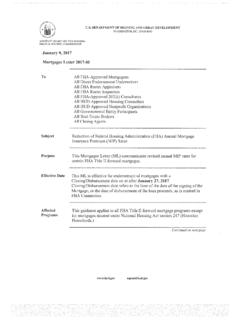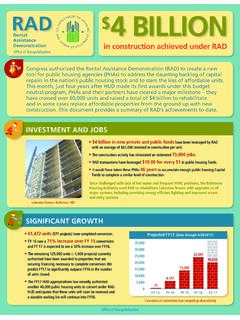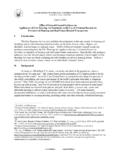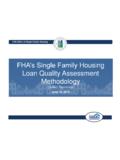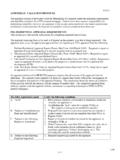Transcription of U.S. Department of Housing and Urban Development Office of ...
1 Department of Housing and Urban Development Office of Public and Indian Housing Public and Indian Housing _____ Special Attention of: Notice PIH 2015-19 Public Housing Agency Directors Public Housing Hub Offices Directors Issued: November 2, 2015 Public Housing Field Office Directors Resident Management Corporations Expires: This notice remains in effect until All Multifamily Hub Directors amended, superseded, or rescinded.
2 All Multifamily Program Center Directors _____ Subject: Guidance for Public Housing Agencies (PHAs) and Owners of Federally-Assisted Housing on Excluding the Use of Arrest Records in Housing Decisions 1. Background For the past five years HUD has been an active member of the federal interagency reentry council . This council , made up of more than 23 federal Agencies, meets on a regular basis to act on issues that affect the lives of those released from incarceration. An important aspect of the reentry council s work has been to have each federal Agency identify and address collateral consequences that individuals and their families may face because they or a family member has been incarcerated or has had any involvement with the criminal justice In 2011, former HUD Secretary Shaun Donovan issued a letter to public Housing authorities (PHAs)
3 Across the country emphasizing the importance of providing second chances for formerly incarcerated Secretary Donovan urged PHAs to adopt admission policies that achieve a sensible and effective balance between allowing individuals with a criminal record to access HUD-subsidized Housing and ensuring the safety of all residents of such Housing . A year later, Secretary Donovan encouraged owners of HUD-assisted multifamily properties ( owners ) to do the same and reiterated HUD s goal of helping ex-offenders gain access to one of the most fundamental building blocks of a stable life a place to live.
4 HUD has also previously stressed the troubling relationship between Housing barriers for individuals with criminal records and homelessness, stating that the difficulties in reintegrating into the community increase the risk of homelessness for released prisoners, and homelessness in turn 1 For more information on the initiatives of the council members, see 2 Letter from Shaun Donovan, Secretary, United States Department of Housing and Urban Development , to Public Housing Authority Executive Directors (June 17, 2011), available at 2 increases the risk of subsequent re-incarceration.
5 3 At a time when an estimated 100 million (or nearly one in three) Americans have some type of criminal record,4 HUD remains committed to the goal of providing second chances to formerly incarcerated individuals where appropriate and to ensuring that individuals are not denied access to HUD-subsidized Housing on the basis of inaccurate, incomplete, or otherwise unreliable evidence of past criminal conduct. With those aims, and in response to requests from Housing providers and prospective tenants for guidance from HUD regarding the proper use of criminal records in Housing decisions, HUD is issuing this notice.
6 2. Purpose The purpose of this Notice is to inform PHAs and owners of other federally-assisted Housing that arrest records may not be the basis for denying admission, terminating assistance or evicting tenants, to remind PHAs and owners that HUD does not require their adoption of One Strike policies, and to remind them of their obligation to safeguard the due process rights of applicants and tenants. The Notice also reminds PHAs and owners of their obligation to ensure that any admissions and occupancy requirements they impose comply with applicable civil rights requirements contained in the Fair Housing Act, Title VI of the Civil Rights Act of 1964, Section 504 of the Rehabilitation Act, and Titles II and III of the Americans with Disabilities Act of 1990, and the other equal opportunity provisions listed in 24 CFR Finally, the Notice provides best practices and peer examples for PHAs and owners to review.
7 3. HUD Does Not Require PHAs and Owners to Adopt One Strike Policies HUD does not require that PHAs and owners adopt or enforce so-called one-strike rules that deny admission to anyone with a criminal record or that require automatic eviction any time a household member engages in criminal activity in violation of their lease. Instead, in most cases, PHAs and owners have discretion to decide whether or not to deny admission to an applicant with certain types of criminal history, or terminate assistance or evict a household if a tenant, household member, or guest engages in certain drug-related or certain other criminal activity on or off the premises (in the case of public Housing ) or on or near the premises (in the case of Section 8 programs).
8 5 3 Guidance on Housing Individuals and Families Experiencing Homelessness Though the Public Housing and Housing Choice Voucher Programs, HUD PIH Notice 2013-15 (HA), 8 (June 10, 2013), available at 4 Bureau of Justice Statistics, Dep t of Justice, Survey of State Criminal History Information Systems, 2012, 3 (Jan. 2014), available at 5 HUD regulations outline the limited instances where denial of admission or termination of assistance is required in the public Housing , Housing Choice Voucher and Section 8 multifamily programs.
9 See 24 CFR Part 5, subpart I; Part 960, subpart B; Part 966, subpart A; Part 982, subpart L. 3 In deciding whether to exercise their discretion to admit or retain an individual or household that has engaged in criminal activity, PHAs and owners may consider all of the circumstances relevant to the particular admission or eviction decision, including but not limited to: the seriousness of the offending action; the effect that eviction of the entire household would have on family members not involved in the criminal activity; and the extent to which the leaseholder has taken all reasonable steps to prevent or mitigate the criminal activity.
10 Additionally, when specifically considering whether to deny admission or terminate assistance or tenancy for illegal drug use by a household member who is no longer engaged in such activity, a PHA or owner may consider whether the household member is participating in or has successfully completed a drug rehabilitation program, or has otherwise been rehabilitated 4. An Arrest is Not Evidence of Criminal Activity that Can Support an Adverse Admission, Termination, or Eviction Decision Subject to limitations imposed by the Fair Housing Act and other civil rights requirements,7 PHAs and owners generally retain broad discretion in setting admission, termination of assistance, and eviction policies for their programs and properties.
